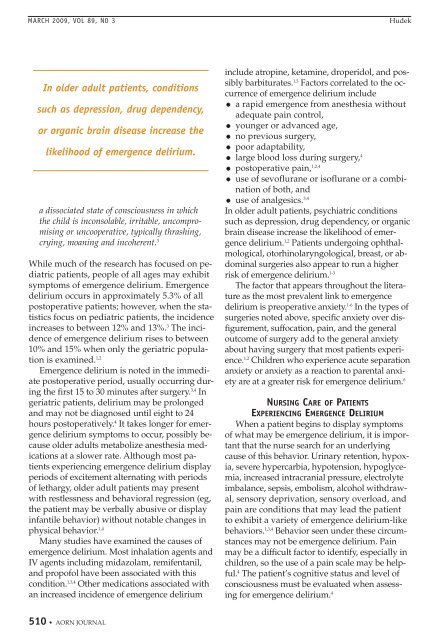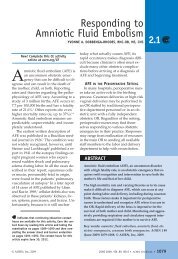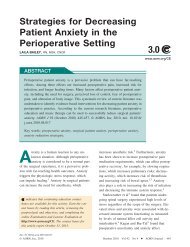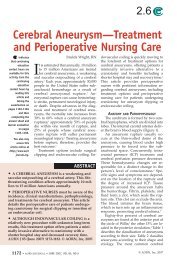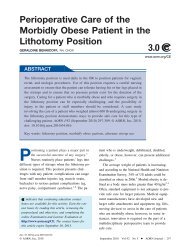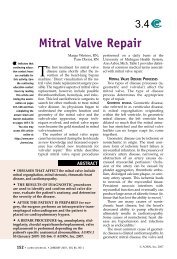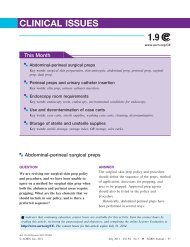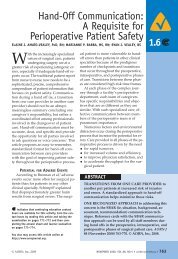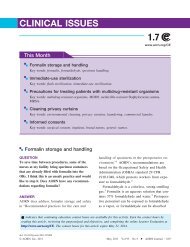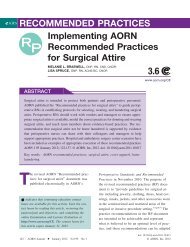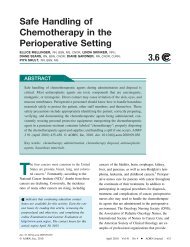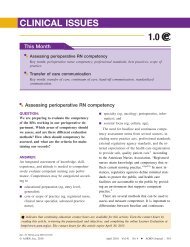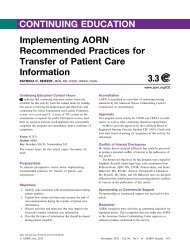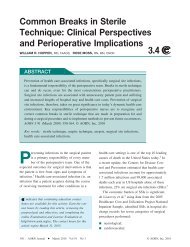Emergence Delirium: A Nursing Perspective - AORN
Emergence Delirium: A Nursing Perspective - AORN
Emergence Delirium: A Nursing Perspective - AORN
You also want an ePaper? Increase the reach of your titles
YUMPU automatically turns print PDFs into web optimized ePapers that Google loves.
MARCH 2009, VOL 89, NO 3HudekIn older adult patients, conditionssuch as depression, drug dependency,or organic brain disease increase thelikelihood of emergence delirium.a dissociated state of consciousness in whichthe child is inconsolable, irritable, uncompromisingor uncooperative, typically thrashing,crying, moaning and incoherent. 3While much of the research has focused on pediatricpatients, people of all ages may exhibitsymptoms of emergence delirium. <strong>Emergence</strong>delirium occurs in approximately 5.3% of allpostoperative patients; however, when the statisticsfocus on pediatric patients, the incidenceincreases to between 12% and 13%. 3 The incidenceof emergence delirium rises to between10% and 15% when only the geriatric populationis examined. 1,2<strong>Emergence</strong> delirium is noted in the immediatepostoperative period, usually occurring duringthe first 15 to 30 minutes after surgery. 3,4 Ingeriatric patients, delirium may be prolongedand may not be diagnosed until eight to 24hours postoperatively. 4 It takes longer for emergencedelirium symptoms to occur, possibly becauseolder adults metabolize anesthesia medicationsat a slower rate. Although most patientsexperiencing emergence delirium displayperiods of excitement alternating with periodsof lethargy, older adult patients may presentwith restlessness and behavioral regression (eg,the patient may be verbally abusive or displayinfantile behavior) without notable changes inphysical behavior. 1,4Many studies have examined the causes ofemergence delirium. Most inhalation agents andIV agents including midazolam, remifentanil,and propofol have been associated with thiscondition. 1,3,4 Other medications associated withan increased incidence of emergence deliriuminclude atropine, ketamine, droperidol, and possiblybarbiturates. 1,3 Factors correlated to the occurrenceof emergence delirium include• a rapid emergence from anesthesia withoutadequate pain control,• younger or advanced age,• no previous surgery,• poor adaptability,• large blood loss during surgery, 4• postoperative pain, 1,2,4• use of sevoflurane or isoflurane or a combinationof both, and• use of analgesics. 3,4In older adult patients, psychiatric conditionssuch as depression, drug dependency, or organicbrain disease increase the likelihood of emergencedelirium. 1,2 Patients undergoing ophthalmological,otorhinolaryngological, breast, or abdominalsurgeries also appear to run a higherrisk of emergence delirium. 1-3The factor that appears throughout the literatureas the most prevalent link to emergencedelirium is preoperative anxiety. 1-6 In the types ofsurgeries noted above, specific anxiety over disfigurement,suffocation, pain, and the generaloutcome of surgery add to the general anxietyabout having surgery that most patients experience.1,2 Children who experience acute separationanxiety or anxiety as a reaction to parental anxietyare at a greater risk for emergence delirium. 6NURSING CARE OF PATIENTSEXPERIENCING EMERGENCE DELIRIUMWhen a patient begins to display symptomsof what may be emergence delirium, it is importantthat the nurse search for an underlyingcause of this behavior. Urinary retention, hypoxia,severe hypercarbia, hypotension, hypoglyce -mia, increased intracranial pressure, electrolyteimbalance, sepsis, embolism, alcohol withdrawal,sensory deprivation, sensory overload, andpain are conditions that may lead the patientto exhibit a variety of emergence delirium-likebehaviors. 1,3,4 Behavior seen under these circumstancesmay not be emergence delirium. Painmay be a difficult factor to identify, especially inchildren, so the use of a pain scale may be helpful.4 The patient’s cognitive status and level ofconsciousness must be evaluated when assessingfor emergence delirium. 4510 • <strong>AORN</strong> JOURNAL


